It has been five years since President Rodrigo Duterte was sworn in as president of the Philippines, and vowed to provide every Filipino citizen the security and territorial integrity in the midst of the Philippine’s fight for sovereign rights over the Philippine seas.
In a PTV documentary special on the President’s five-year leadership titled “Right is Might” that aired on July 10, it highlighted the significant efforts of the Duterte administration to adopt diplomatic solutions in addressing national issues such as the West Philippine Sea dispute, the Marawi Siege, and Bangsamoro Transition Authority.
The Philippine territory
A tense standoff between Chinese and Philippine ships at Scarborough Shoal on April 8, 2012, where eight Chinese fishing vessels were caught illegally fishing here, led the Philippines to institute arbitral proceedings against China at the Permanent Court of Arbitration.
The Philippines even presented at least 170 maps containing the Philippines’ whole archipelago to the Arbitral Tribunal, including the 1734 Murillo Velarde Map – the first Philippine scientific map, which is recognized as the mother of all Philippine maps.
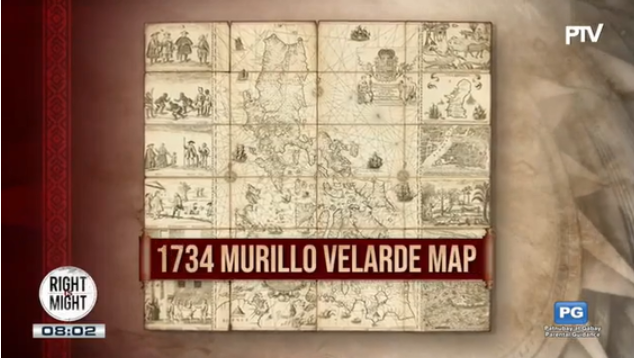
After three years, the country received the Arbitral Award from the Permanent Court of Arbitral which stated that China had no legal basis in claiming any islands within the Philippines’ exclusive economic zone (EEZ).
On the long-standing West Philippine Sea issue, the President said at the 75th session of the United Nations General Assembly (UNGA) on September 22, 2020 (New York date) that the Philippines affirm the commitment in the South China Sea in accordance with United Nations Convention on the Law of the Sea (UNCLOS) and the 2016 Arbitral Award.
“The Award is now part of international law, beyond compromise and beyond the reach of passing governments to dilute, diminish, or abandon,” the President said. “We firmly reject attempts to undermine it,” he added.
Defense Secretary Delfin Lorenzana told PTV that diplomacy is the most effective way, as to how the government wants to “talk about the problem like mature people.”
Lorenzana clarified that the Pag-asa Island is a part of the Municipality of Kalayaan and is a part of the country’s territory. It has the largest detachment composed of marines and airforce personnel, which secures the Philippine satellites and marine resources in the that is about 32 hectare-wide island. There are plans to build an airstrip in order to gain access to the island.
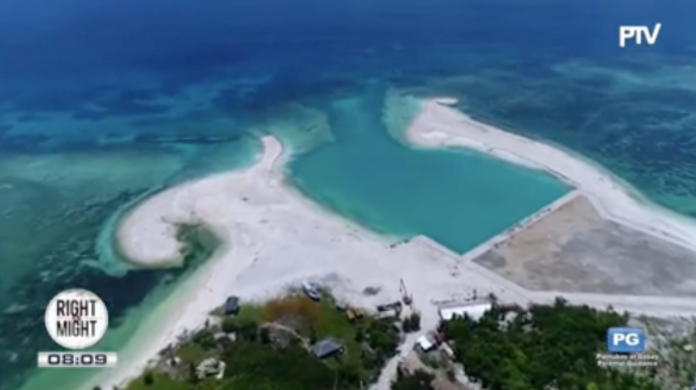
Furthermore, the President’s efforts in claiming the West Philippine Sea islands is clear in the strengthening of the Armed Forces of the Philippines (AFP) modernization.
According to Lorenzana, the AFP Modernization Program will be implemented for 15 years, from 2013 to 2028, which will undertake reforms in the recruitment, training, employment, and management of AFP personnel; development, validation, or modification of AFP doctrines; acquisition and upgrading of appropriate technology and equipment; and relocation, improvement, and construction of bases and other facilities.
War on drugs
“They’re destroying the country and they’re destroying the youth of the land,” the President, referring to the drug trafficking in the country, said at the Philippine Illegal Drug Trade Hierarchy and press interview on July 7, 2016.
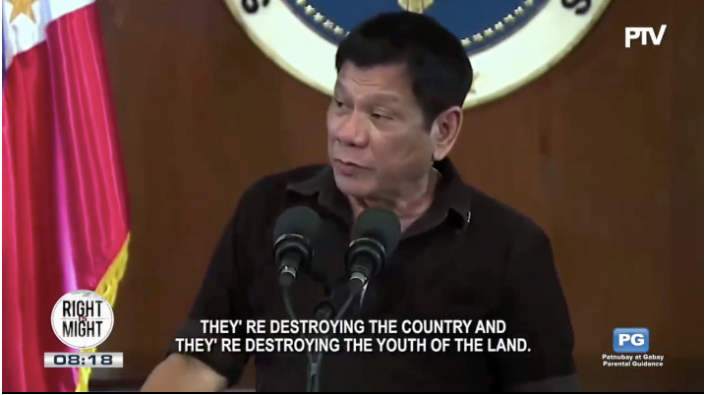
The Duterte administration has enacted several programs against drugs, including the “Barangay Drug Clearing Program” which provides rehabilitation to drug users.
According to the Philippine National Police (PNP) Chief Police Gen. Guillermo Eleazar, the PNP has conducted more than 200,000 police operations against illegal drugs which resulted in the arrest of around more than 290,000 individuals, while a total of 700 drug dens have been raided and some ₱59 billion worth of illegal drugs and other paraphernalias have been confiscated for the past five years.
Around four million people were using drugs in the country prior to Duterte’s presidency. In 2019, the number of illegal drug users dropped to more than half a million.
Philippine Drug Enforcement Agency (PDEA) Chief Wilkins Villanueva also told PTV that under President Duterte’s administration, the operation in industrial laboratories of these illegal drugs were stopped, their anti-drug operations were downsized to kitchen-type entrapment operations.
“Kasi dati, ang nangyayari walang mapuntahan ang users na rehabilitation, kasi mahal magpa-rehab. Right now, nagkaroon tayo ng holistic approach. Part of the budget of the barangay should be [allotted for the] implementation of the anti-drug program. And part of that is ‘yung prevention and rehabilitation,” Villanueva said.
“Itong mga datos na ito [ay] nagpapatunay na within this administration of our President, [ang PNP] ay nagsagawa ng napakaraming operasyon na nagbunga ngayon ng malaking epekto sa ating kampanya against illegal drugs,” Eleazar told PTV.
The PNP said the programs to eradicate the sale and consumption of illegal drugs aim to produce responsible citizens and to further progress this nation.

“‘Yung fight against illegal drugs is not limited to only the PNP and PDEA. Ang laban ng illegal na droga ay laban ng buong bayan, particularly laban ng komunidad. Kung hindi nanaisin ng komunidad na magkaroon ng droga, maiiwasan natin yan. Hindi papasok ang illegal na droga diyan,” Eleazar said.
According to Villanueva, among 42,045 barangays, 21,891 have been cleared from drugs, while 13,400 are still being inspected by the government. Alongside the fight against illegal drugs, the President also released the narco list, a list of politicians and prominent individuals involved in illegal drug operations.
On terrorism
Besides fight against illegal drugs, the President also aimed to put an end to terrorism in the country through the Republic Act No. 11479 or the Anti-Terrorism Act (ATA) of 2020.
Amid protests and criticism, the government assured the public that RA 11479 was a means to protect the people.
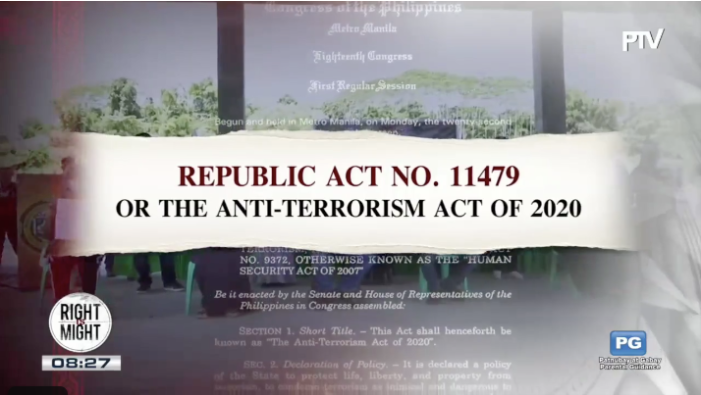
“Ngayon, ang bagong situation ay marami [nang] tinatawag na “foreign fighters.” To prevent the expansion of foreign-bred and homegrown terrorism in the country, lalo na ang foreign terrorist na nakita natin sa Marawi… The anti-terrorism act was crafted to reflect the evolving nature of terrorism and the international standards required to address the problem,” National Security adviser Hermogenes Esperon told PTV.
The ATA highlights the value, protection, and promotion of universal human rights. Apart from the protection of human rights and lives from terrorism, the ATA also brings the Philippines at par with strong democracies in the fight against terrorism, and strengthens the country’s legal system against terrorist financing and terrorist activities.
Esperon further clarified that activism is not terrorism, and vice versa.
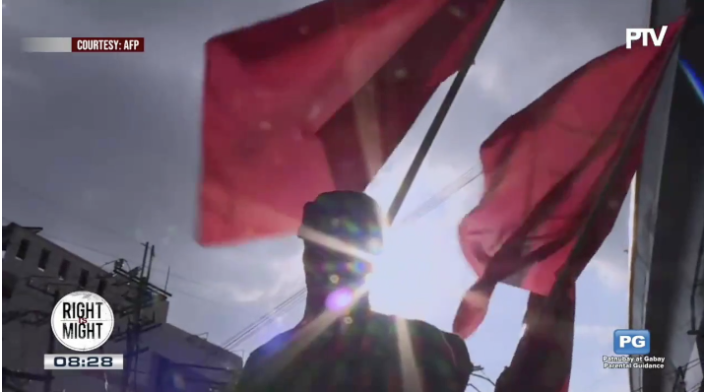
Meanwhile, to end the conflict against members of rebel groups such as the New People’s Army, the National Task Force to End Local Communist Armed Conflict or NTF-ELCAC was formed in 2018 under Executive Order No. 70 to encourage rebel groups to return to the government as reintegrated members of society.
Marawi Siege
On May 23, 2017, the residents of Marawi City in Lanao Del Sur went through a nightmare when some residents marched down the streets with firearms while waving the ISIS (Islamic State) flags. It led to the President’s declaration of Martial Law in the entire Mindanao.
“Ang purpose ni Isnilon Hapilon, [who was said to be the ISIS group’s leader in Southeast Asia],… is to create an ISIS territory and napili nila is ang Marawi City,” BGen. Jose Maria Cuerpo II told PTV.
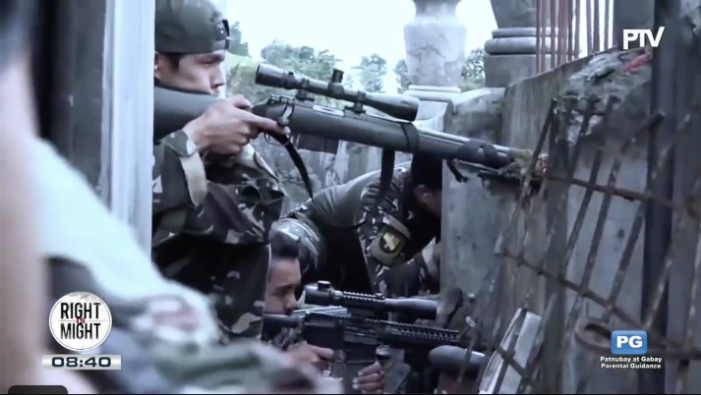
Marawi City is the only Islamic city in the Philippines, with 99% of its population are Islam followers.
Five months later, on October 22, 2017, Duterte declared that the Marawi crisis had ended after Hapilon, one of the most wanted terrorists in the US, was killed along with another wanted militant, Omar Maute.
Bangon Marawi
Through Administrative Order No. 3 signed by the President on June 28, 2017, the Task Force Bangon Marawi was created to facilitate the rehabilitation, recovery, and reconstruction efforts in the Marawi siege even before the crisis ended.
The responsibilities of Task Force Bangon Marawi include organizing and deploying of a quick response team, conducting a post-conflict needs assessment, facilitating and overseeing the construction of shelters for displaced persons, coordinating the immediate restoration of public utilities, attending to the basic needs of affected residents, providing an environment conducive to business and livelihood activities, ensuring restoration of peace and order among others.
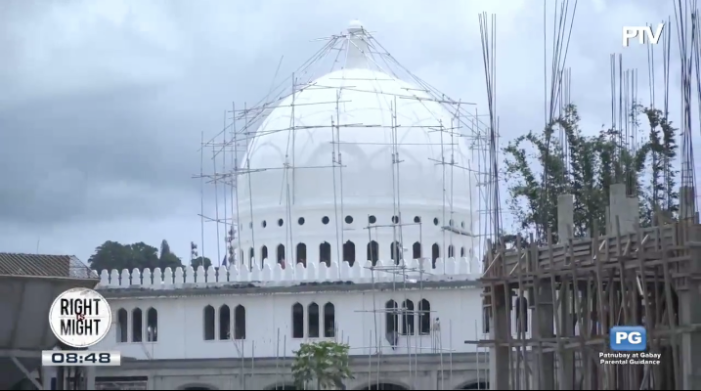
Further, Task Force members have formed themselves into five sub-committees: Reconstruction, Housing, Health and Social Welfare, Business and Livelihood, and Peace and Order. It may create such other sub-committees for the necessary implementation of the order.
Read more: Duterte creates Task Force Bangon Marawi
Task Force Bangon Marawi field manager Asec. Felix Castro, Jr. told PTV that last June 2017, barely a month after the start of the Marawi scene, a task force was already created by the President composed of 56 government agencies to convene interventions to rehabilitate Marawi.
In January 2018, about 500 temporary shelters were turned over to 500 families.
“May mga different sites tayo, I think around six sites and we’re building around 4,855 transitory shelters, so hindi siya round figure,” Castro said.
Aside from reconstruction of houses, Bangon Marawi also lined up the building of schools, markets, museums, convention centers, barangay halls, health centers, and mosques.
“Kung titingnan natin, ang pinaka-focus natin ay infrastructure,” he added.
To date, about 60% of the construction projects have been completed, and these are expected to be fully completed by the first quarter of 2022.
The Bangsamoro Organic Law
Alongside these rehabilitation efforts, the government sought for a long-term solution to maintain peace in the region, which led to the ratification of the Bangsamoro Autonomous Region in Muslim Mindanao (BARMM) through Republic Act No. 11054 or the Bangsamoro Organic Law.
“Natutuwa kami na finally… buo na ito at naipasa noong panahon ni Pangulong Duterte,” Ministry of the Interior and Local Government of BARMM Minister Atty. Naguib Sinarimbo told PTV, adding that, “‘Yun pong panibago na batas at gobyerno na itinatatag nito, ang Bangsamoro government, reflective na siya sa pangarap ng Bangsamoro na magkaroon ng sarili nilang pagpapasya.”
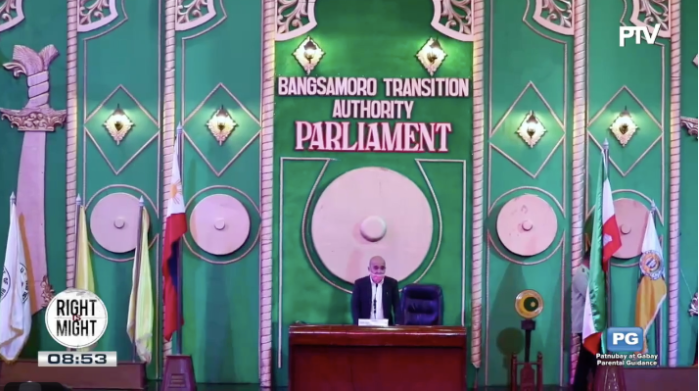
Despite the creation of this parliamentary government, non-Moro residents living within BARMM are still given representation in the parliament, wherein they can also hold Cabinet positions.
BARMM Chief Minister Ahod Ebrahim said one of BARMM’s purpose is to encourage former Moro Islamic Liberation Front (MILF) combatants to join their reform.
“We have to decommission, then we have to train and capacitate them in order to live a normal life as a productive member of [our communities],” he said. To date, 13,500 MILF combatants were decommissioned.
“Malaki ang pinagbago… the violent incidents have been pulled down significantly. Mayroon pa rin pero hindi na kagaya noon na everywhere [ay] mayroong incident,” Ebrahim said.
– PTV / CF, PG -rir
Watch the full PTV documentary special “Right is Might” here:
